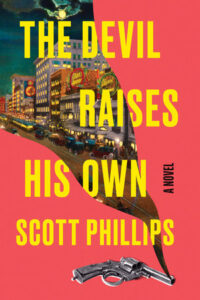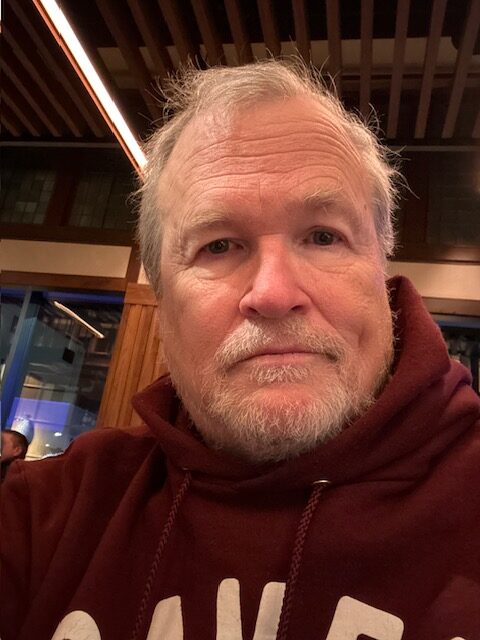Scott Phillips is one of the most acclaimed writers to emerge from Wichita — a place featured prominently in some of his fiction. The author of eight novels and a short story collection in the noir literary genre, Phillips is probably best known for “The Ice Harvest,” which won several awards and was turned into a movie. His most recent novel, “The Devil Raises His Own,” was published last year. Phillips lives in St. Louis with his wife and daughter. This interview has been lightly edited.
Can you talk about your background in Wichita and if there was anything in it that led you to become a writer of hard-boiled crime fiction?
“Well, my mom was — before true crime was really a genre — my mom was just obsessed with crime. She would deny that, but she talked about it all the time. We would pass a house and she would say, ‘That’s where a murder happened.’ I guess I picked that up from her.
“The teachers I had were a mixed bag over the years, but I never had a bad English teacher. Every English teacher I ever had encouraged me.
“My freshman year at Wichita State, I had James Lee Burke (author of the Dave Robicheaux series) for freshman comp, and later I had him for creative writing. He was always very encouraging. I think he was with everybody.”
At what age did you write your first full-blown story?
“I wrote a novel when I was in my 20s which was pretty terrible and never got published. I just didn’t know how to write a novel. But I realized the idea of a writing a manuscript that was 200 pages or more was no longer daunting. I could do that. After that I got into screenwriting. I had a friend who was a well-known actor in France at the time, and we started writing screenplays together.
“I made my first movie after I got to Los Angeles. It really was a terrible process. I thought, ‘I’m done with this. I’m going to go back and write another novel.’ I guess I had learned enough through screenwriting that I was able to write a good one, and that was ‘The Ice Harvest.’”

According to your bio, you’ve had some interesting jobs, both here and after leaving Wichita. Can you talk about a bit about that?
“I worked for a number of years at B. Dalton Booksellers, which is a great job for anybody who wants to write books. You see what kind of books sell and what kind of books don’t sell. Plus, we could take books home — borrow them and sign them out. You read a lot of stuff you might not have ordinarily discovered.
“I worked at Moler’s Camera for a long time, and that led me to get jobs as a photographer. I did weddings and stuff like that. I did real estate photography for the (Wichita) Eagle, which led me to take on architectural photography as a hobby. I got into photography because I wanted to make movies.
“I used to take students from Wichita to Strasbourg (France) in the summers. That allowed me to go on a paid trip to Europe every summer for about eight years. At the end of that, I ended up just staying five years. I was a translator, a teacher, then I started writing screenplays.”
You feature Wichita in some of your books. Can you talk about how the city plays into your fiction?
“The first two are explicitly set in Wichita. The third has some Wichita stuff in and the collection of short stories has lots in it.
“Wichita is always a place I go back to in my mind, just because I know it really well. It’s easy for me to imagine stories that happen here. I know a lot of people there, I know a lot of stories.”
Do you have a favorite writer or writers?
“I have a lot of them. Charles Williford is a favorite. Georges Simenon — a Belgium writer — I read a lot of his stuff. I like Charles Portis, an Arkansas writer. I’m reading a book right now by Tim O’Brien, who wrote ‘The Things We Carry.’ Patricia Highsmith, I should say.”
Most people aren’t criminals. What is our enduring fascination with them in books, TV shows and movies?
“It’s because they do things that are forbidden. One of my best friends is very religious, but he writes these stories about criminals really doing vile things. Often the stories are quite dirty. But he’s fascinated, being a very moral person.
“A little bit of it is like slowing down whenever you drive by a wreck. You want to see how it happened.
“And here’s one reason I like characters who are bad. It’s the same thing an actor will tell you; they love to play villains. You get to imagine doing things you’d never do.”
You drew a big crowd to Watermark (for a book signing last fall). Do you still have many friends and family here?
“Not much family anymore. I have an aunt and some cousins. But I do have a lot of friends and still think of that as my hometown, no matter where I end up living. I go back a lot. I was one of those kids who couldn’t wait to get away, and now I take every excuse to go back.”
Do some Wichitans think they recognize themselves in your books?
“Not recognizing themselves, but (Wichita friend) Dan Rouser is always coming up to me and saying, ‘Remember this story?’ He always knows if I’m writing about something real. Occasionally, I’ll have somebody think I based a character on them. I have to tell them it came out of my head — not that I’m proud of that (laughs).”
Tell us a little about your most recent book, “The Devil Raises His Own.”
“The Wichita connection is there’s a murder in the prologue to the book that actually happened in Wichita. It’s based on a transcript I bought on eBay. It was a typed murder confession, typed by a stenographer, from about 1920. This woman was confessing to having murdered her husband. Charges were not filed. She was freed. I found the story fascinating.
“I set it in an apartment above the Marple Theatre. I used to work there as a projectionist. There’s blood dripping down into the projection room. It’s a story about the early days of Hollywood and the birth of the dirty movie industry.”
You might find it surprising how many of our readers decide to write books, including novels. Any advice?
“Sit down and start writing. That’s really the best advice. Don’t think about the marketplace. Write something that you would want to read. That was the thing that changed my career. I had been trying to write things that would appeal to some imaginary movie producer or whatever.
“The main thing is to sit down and write, and don’t worry if it’s not brilliant immediately. Just keep working on it.”









